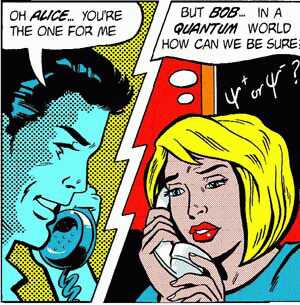Other topics:
Emergence
Strings
Gravity and Cosmology
Condensed Matter Physics
Nanoscience
Quantum Mechanics
Elementary Particles
Quantum Fluids

QUANTUM MECHANICS
Quantum Mechanics, discovered in 1925, has probably had a greater impact on human history than any other invention of the human mind. It is a theory which has explained every physical phenomenon it has been applied to, and which has shown no limits to its validity. The revolutionary advances in physics, astronomy, chemistry, and biology in the 20th century can be almost entirely attributed to quantum mechanics, as can the extraordinary developments in technology. Yet there is every reason to suppose that we have hardly used the resources of this theory so far, so that future changes will be far more striking.
 The
irony is that the most powerful and successful theory
in history is fundamentally mysterious to us. It
involves concepts like (i) 'entanglement' (the
formation of quantum states of composite systems, even
when the individual members of the composite do not
possess a definite state), or (ii) quantum
superposition (in which a system that can exist in
different states can also exist simultaneously in all
of them). These features violate common sense, and yet
are central to the theory- and are seen in labs every
day, at the atomic scale. Thus quantum mechanics poses
very deep philosophical questions about the nature of
physical reality to which we have no answer at present.
The
irony is that the most powerful and successful theory
in history is fundamentally mysterious to us. It
involves concepts like (i) 'entanglement' (the
formation of quantum states of composite systems, even
when the individual members of the composite do not
possess a definite state), or (ii) quantum
superposition (in which a system that can exist in
different states can also exist simultaneously in all
of them). These features violate common sense, and yet
are central to the theory- and are seen in labs every
day, at the atomic scale. Thus quantum mechanics poses
very deep philosophical questions about the nature of
physical reality to which we have no answer at present.
Until recently the strangest consequences of quantum mechanics had only been seen at the atomic and molecular levels. In the last 3 years experiments have found quantum superpositions in much larger 'superconducting quantum interference devices' (SQUID's for short). This has raised the extraordinary possibility of 'Schrodinger's Cat' states (this refers to Schrodinger's remark that quantum mechanics in principle allowed a Cat to be simultaneously in alive and dead states). The possibility of entangling the states of many different quantum systems has led to a large drive to build a 'quantum computer', and bizarre possibilities, like the 'quantum teleportation' of quantum states between 2 places, have already been achieved. It is virtually certain that the 21st century will end up being decisively influenced by the development and use of quantum mechanics.
University of British Columbia
Hennings Building, 6224 Agricultural Road
Vancouver, BC V6T 1Z1, Canada